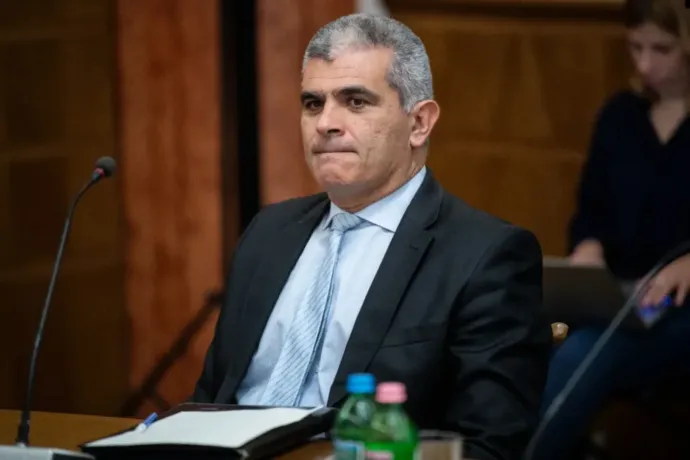President of National Judicial Council resigns after deal with government

Péter Szabó, president of the National Judicial Council (OBT), resigned from his post as president at Tuesday's extraordinary meeting, but his membership in the OBT will remain, Telex has learned from two different sources.
A vote of confidence was initiated against Szabó for Tuesday after the government's new judicial reform led some judges to fear for their independence, citing blackmail and political pressure. According to a leaked internal conversation, however, Péter Szabó said that they had no say in the agreement with the government and if they had not given in to the ministry, there would have been no pay rise. On the independence of the judiciary, he said that while there may be sensitivities and concerns about it, the agreement had to be accepted.
Five judges – Fatime Mária Megyesy Félegyházi, Ágnes Hild, Dóra Kardos, Ágnes Kozlovszky, András István Nagy – initiated the vote of confidence against their president.
After Szabó's resignation, the OBT issued a statement saying: 'The tasks and powers of the OBT are defined by law, which the Council may not exceed, and it shall act solely in accordance with these rules. In exercising its right to advise on legislation, the OBT acts in the interests of judges, judicial staff and the judiciary, with due regard to judicial independence, judicial self-government and professionalism. The OBT fulfils its mission by acting as a body".
What is this reform?
On 20 November, the National Judicial Council, the apex body of judicial self-administration and the professional supervisor of the courts, adopted a highly controversial proposal by the Ministry of Justice that would provide more than 130 billion forints for a pay rise for judges and judicial staff, provided that judicial leaders agree to certain organisational changes in return. Such changes would include allowing judges to remain in their posts until the age of 70 while raising the minimum age for appointing judges to 35. According to the government's plans, it would be easier for outsiders to apply for judgeships because experience in other areas of law would be taken into account more emphatically in appointments. They could also be seconded to another court under certain conditions.
The agreement was concluded between the Ministry of Justice, led by Bence Tuzson, and the three actors of the judicial system, the National Office for the Judiciary, the Curia and the National Judicial Council (OBT). This came as a surprise, as the OBT had previously been in conflict over judicial independence with the National Office for the Judiciary, which was set up by the government in 2011 to increase its influence in the judiciary.
Critical voices
The Hungarian Association of Judges (Mabie), an NGO representing the interests of judges and judicial staff, sharply criticised the deal already on the day of its adoption, because they believe it threatens the independence of judges. On their website, they published more than a hundred protest statements, in which judges, lawyers and court secretaries explained their opposition to the agreement, stating their names and titles as well.
It is telling that the OBT itself was divided on the issue: of the 14 elected members of the 15-member body, as many opposed the agreement as supported it, the latter camp including the OBT President. Thus, in the end, it was the vote of András Zs.Varga, the President of the Curia, who is an ex officio member of the OBT, that decided. It is not surprising that the President of the Curia supported the government's offer since he himself signed the quadripartite agreement. It is known from earlier that András Zs. Varga, who has no judicial experience, owes it to Fidesz that he was allowed to be President of the Curia at all.
The seriousness of the situation is shown by the fact that Adrienn Laczó, the President of the Criminal Chamber of the Metropolitan Court and a member of the Board of the Res Iudicata Association, who has been in the field for more than twenty years, resigned from her position as a judge due to the agreement between the OBT and the government. She previously presided over the case of György Simonka, a former Fidesz MP accused of corruption offences. "I have always judged with faith and conviction. Unfortunately, the justice system of which I tried to be a committed representative has now ceased to exist. Having no other choice, I resigned from the bench today," she said.
Why do they say that the agreement endangers the functioning of the judiciary?
Because the very fact that they will only get their long-awaited pay rise if they agree to the government's planned reforms is in itself an attack on their independence. The protesting judges argue that a pay settlement to ensure the independence of the judiciary is non-negotiable and cannot be made subject to any conditions.
The fact that the agreement was drawn up in secret and in a hurry is also a sign of political pressure. According to the weekly, HVG, the final draft was received by the members of the Hungarian Judicial Council and the Hungarian Association of Judges only two days before the meeting on 20 November. There is also concern that the agreement does nothing to prevent the government from coming up with whatever legislation it wants in the future. This was effectively admitted by György Senyei, President of the National Office for the Judiciary, when asked about the legal force of the agreement.
For more quick, accurate and impartial news from and about Hungary, subscribe to the Telex English newsletter!